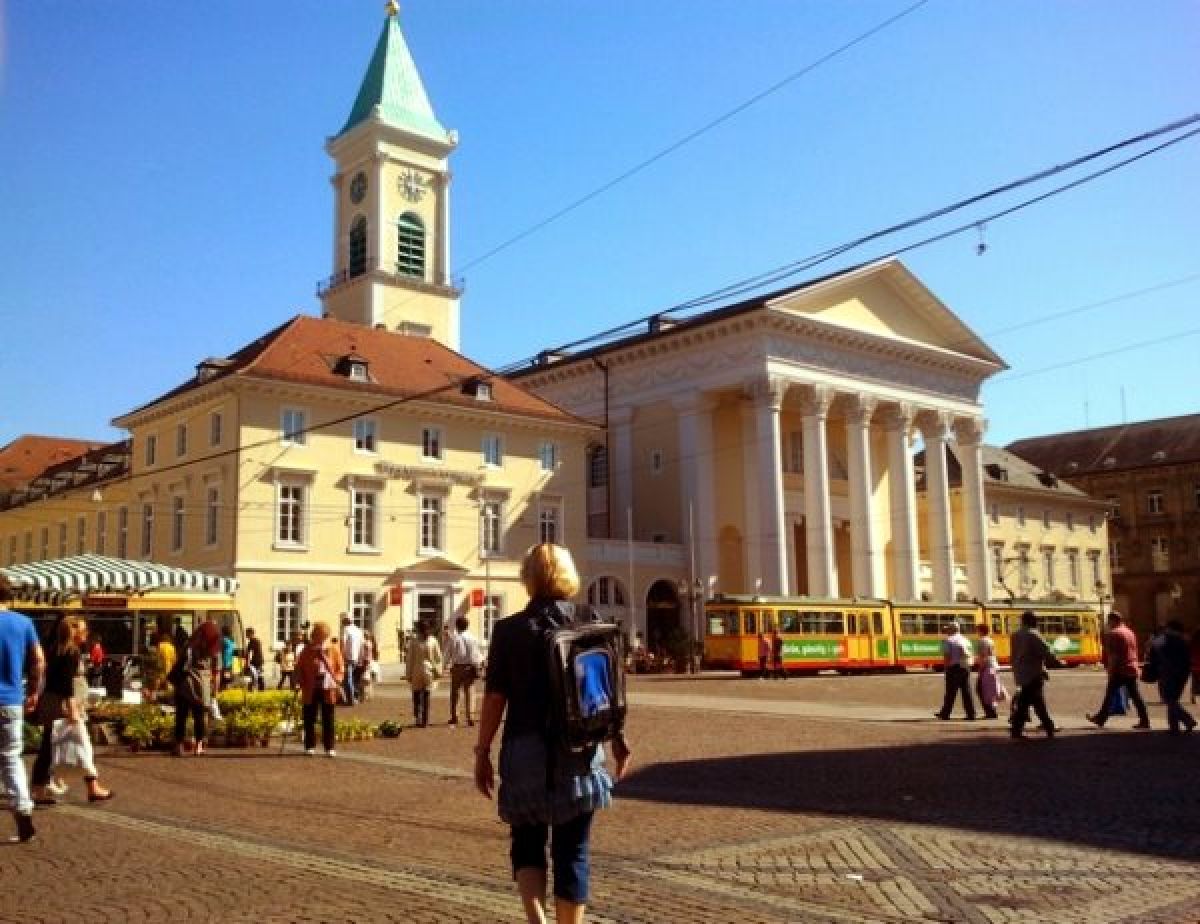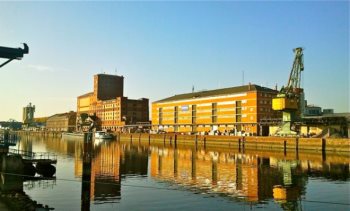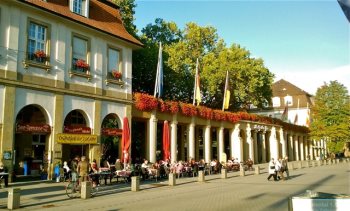
Why did you decide to move to Karlsruhe?
I had been living in Stuttgart for five years prior to my move, and when the opportunity arose to join my company's team in Karlsruhe (the former capital of a once-independent Baden) last year, I jumped at the chance to experience life in the Baden side of our state of Baden-Württemberg, of which Stuttgart is the present-day capital. The chance to leave the more socially conservative Swabia and to cross west over the Baden-Württemberg "divide" was too good to pass up. Karlsruhe is smaller than Stuttgart and the Badeners and Swabians who live here are historically different. I wanted the chance to experience the differences. Although I miss some wonderful friends over in Stuttgart, I am still pleased to have made the move.
How was the moving process?
The move itself was as easy as it would have been in the States, in that I simply rented a truck, got friends to help load it, drove to Karlsruhe, unloaded it and voilà, I was in my new home. However, I would think that most people residing in Germany, be they expats or natives, would find that sounding a bit simplistic. Actually finding my new apartment was a completely different story as apartment hunting in this country can be quite daunting and exhausting, especially if you don't know the way it works. Standing in long lines to see an apartment with many other people who are also seemingly desperate to find housing and then praying that the owner or agent will even consider your application for going on to the next process? Well, simply put, it can be hell. Fortunately for me this was my third move in Germany, so I was well prepared for what was to come, but it didn't help me sleep any better while waiting for an approval. As there were perhaps thousands of young people moving into the city at the same time I was, due to the university semester starting at the exact same time, I was having a hard time, so I ended up having to pay a real-estate agent to get my place. Fortunately, she did an awesome job and got me right into the first place she showed me: a 600-year-old restored home in a beautiful village suburb of Karlsruhe. For me, a history lover, it was like winning the lottery. And, it had a brand-new kitchen already installed! I didn't have to deal with buying one as most people usually end up doing when moving into a new apartment.
Did you face some difficulties to adapt to your host country (language, culture, do's and don'ts)?
Yes and no. I love languages, and I first started learning German in the 9th grade back in Virginia. I kept it up with my French all the way through university, so I already had a very good basis on which to rebuild my German after almost 30 years of dormancy. Languages have always been easy for me, so this has not been a problem.
Culturally speaking, I will say that at the beginning, it appeared that most of the stereotypes were true: "Prussian" orderliness, little flexibility regarding rules, certain social liberalities mixed with old-fashioned customs, lots of beer, very hardworking, etc. But, time has proven that although it may seem that way to some people when first settling in, it usually proves the same as when moving to any new country: we have to really know the people in order to see what the real situation is despite how it may appear. Today I get a real kick out of German stereotypes of the United States. So, it works both ways. We all just need to get to know and understand each other better. Yes, Germans may have varying degrees of the abovementioned stereotypes. However, they are wonderful people who are direct and honest about what they think and perceive, while at the same time being able to shrug off the stuff that they can't do anything about and move on. They may not come across as the "warmest" people on the planet, but their down-to-earth, matter-of-fact directness is something I have come to expect and even enjoy.
Birthdays are very important to most Germans. However, I still cannot get used to the fact that it is I who has to make or buy my own cake and to bring it to work and perhaps provide other goodies for everyone else. I don't want to throw a party for myself! I feel so pathetic and needy doing that (LOL). So, I just keep my birthday quiet and move along like it is no other day.
"Don'ts": I have always been aware never to discuss sensitive topics with nationals of a host country, especially a country against which the U.S. fought a horrible war. It is beyond me when non-Germans bring up the war to them in a careless manner. I don't like Germans complaining about the Kuwait or Iraqi wars with me - no matter my position - and I certainly don't think they like me bringing up a war that is still such an understandably sensitive topic for so many of them, especially since the vast majority of those living today had so little to nothing to do with the one 70 years ago. That is a "don't" for me. I only talk about it with my good German friends when I want to understand more historically. This is their home, and I need to be polite in it, full-stop.
"Do's": Honesty! Just be frank and live up to your words. No "let's do lunch" over here unless you mean it. I've come to like that very much. I respect the Germans for their honesty and opinions. It can be quite shocking at the beginning - especially for this Southerner - but I seem to have taken it up and now I have to watch how I direct I am when back in Virginia on a visit!
Did you have to apply for a visa or work permit to be able to live and work in Germany?

Yes, and I personally found it quite easy. Make an appointment and it can be a bit faster. If you don't have the language, it all seems a bit intimidating, but it always seems to work out. I can only imagine how difficult and bureaucratic it is for foreigners trying to get into the States and wanting to work there! It is no easier - maybe even more difficult. Personally, although I had to get this and that document as well as make several visits to the Ausländeramt (Immigration Office), in the end, it was not so bad at all. Attitude and patience makes all the difference in how it gets done and how one allows it to affect them. I have found it all worth the trouble as I now have permanent residency to work and reside here as long as I want and also to work for anyone I want. So, I have no complaints.
What surprised you the most in Karlsruhe?
Not much. I had visited here several times when I lived over in Stuttgart (45 minutes by train). The seemingly relaxed café and street life has been nice, except for the fact that now the entire city seems to be one big hideous construction site as they are building a subway system under the major streets while at the same time repainting and restoring the palace and other historical landmarks in preparation for the city's 300th anniversary next year. This has been a disappointment for me because this is a small city and it is indeed charming, so the construction machinery has conflicted with many of the formerly beautiful visual perspectives - a big mess for this former urban planner. On the other hand, its proximity to France is a bonus. On the extensive Karlsruhe tram system, one can actually go right over the border into France to a fantastically beautiful town called Wissembourg, all within about an hour. And, one can take the tram deep into the Black Forest on the same system and come back ending up in the middle of Karlsruhe on the Market Square. No car necessary around here.
Is it easy to make friends in Karlsruhe?
After living in Stuttgart, the capital of the "Swabian" side of Baden-Württemberg, one could move to a silent cloister and make friends more easily. Literally, on my first day in Durlach, the historic suburb-village on the eastern edge of Karlsruhe where I now live, my neighbor came over while we were moving in and immediately offered to help out and then to invite me up later to meet others who lived in the building. I know that is not terribly typical anywhere, especially on one's first day, but 10 months later, I am still meeting other people through them. I already have what I would actually call "friends" here. In Stuttgart, my own neighbors would only sometimes even break a slight smile in the stairwell of the apartment building. Of course, there are some very friendly and outgoing Swabians, but they are probably considered odd by their own people. Mind you, many people like to joke about the Swabians and their conservative culture, but let me be clear, if you make a Swabian friend, you have them for life. Some very special Swabians did a lot for me while I lived there.
A common belief about Germany which wasn't right:
They do not all wear Lederhosen; they are rather open-minded; and they don't all march to oompah bands. However, although this country could fit into the U.S. several times geographically, it is still a big country with such a variety of peoples and dialects and histories and perspectives on everything, that it is just impossible to stick them all under one positive OR negative label. Germans are not all the same, any more than Americans are. The differences between eastern, western and southern Germans can be interestingly different as well. And then there is Bavaria! Oh, and their trains do NOT all run on time. And that was a huge surprise.

Why did you start your blog, Capital of the Kingdom?
I love history. It doesn't matter which country I am in, I just love learning how present-day societies, cities, languages, political boundaries, and just about everything else has come to its present form. In the end, this really helps me to learn who the native population really is. It helps me to understand why their history has evolved the way it has. Nothing is less boring for me than history. Germany's fractured history of semi-dependent monarchies in the last empire only as far back as just 95 years ago (my own grandparents were all living at that time) is baffling.
When I arrived in Baden-Württemberg from Cologne, where I first started out in Germany (major differences between the two cities and regions), I learned that the Württemberg part had become an independent kingdom set up by Napoleon in the early 19th century. History books and comments by the Swabians, who make up most of the former kingdom of Württemberg, never spoke or wrote badly about the four kings they had. The last one was quite endeared to the people. I wanted to know more about them, who they were and how they ruled. I wanted to know why the people allowed the monarchy to be swept away if the king had been so loved and respected by his people. It made no sense to me. So, my research began. Together with my love of photography and historical architecture, combined with my already well-established research and historical knowledge of monarchy throughout Europe, I thought I would combine it all and start a photo-blog which touches on these historical points. It is most definitely not a "monarchist" blog, but as Stuttgart was the royal capital of Württemberg, I figured it might be a good place to start with the entire project. The other half of the state, Baden, was a former Grand Duchy within the German Empire and also provided the last Imperial Chancellor of the former German Empire. It has its own interesting royal history, so I decided to start the blog as a kind of history as well as photo-journal of my time here in Germany.
Which advice would you give to people wishing to live in Karlsruhe?
Come and check it all out first. Do not judge it based on all the construction works blocking many of the lovely views. The surrounding areas are filled with such interesting things to see and experience. Find out about all the fun festivals and parties that take place on the streets throughout the city and in environs throughout the year. Ignore the construction (it won't stay forever) and look into the shops. Karlsruhe is not filled only with call-centers, nail-shops, hair dressers and opticians like so many other places. It has nice boutiques, restaurants, vintners, numerous sidewalk cafés in its pedestrian zones, and so much else to see in the surrounding towns. The Black Forest is a stone's throw away and Rhine pleasure cruises leave the port of Karlsruhe daily. Furthermore, the city itself is quite flat and bicycles are aplenty! Be sure to own one and you can go far with it.
What are your plans for the next few years?
Other than my parents and siblings and some life-long friends back in the States, I don't really have much reason to relocate back there. My life and work is in Europe. I may stay here the rest of my life; I don't know. I cannot honestly say that I "love" living in Germany, but in today's world, this country is solid and financially sound. Through it all, it has been good to me. It has allowed me to work here. The people are hard-working and are concerned about their communities and making a better life. Germans are altogether a down-to-earth people. For these reasons alone, I need to be practical in my own thinking about where I am at my age. So, in the meantime, I think I would be foolish to leave it all when things aren't wrong. But who knows? Tomorrow is just another adventure!



















